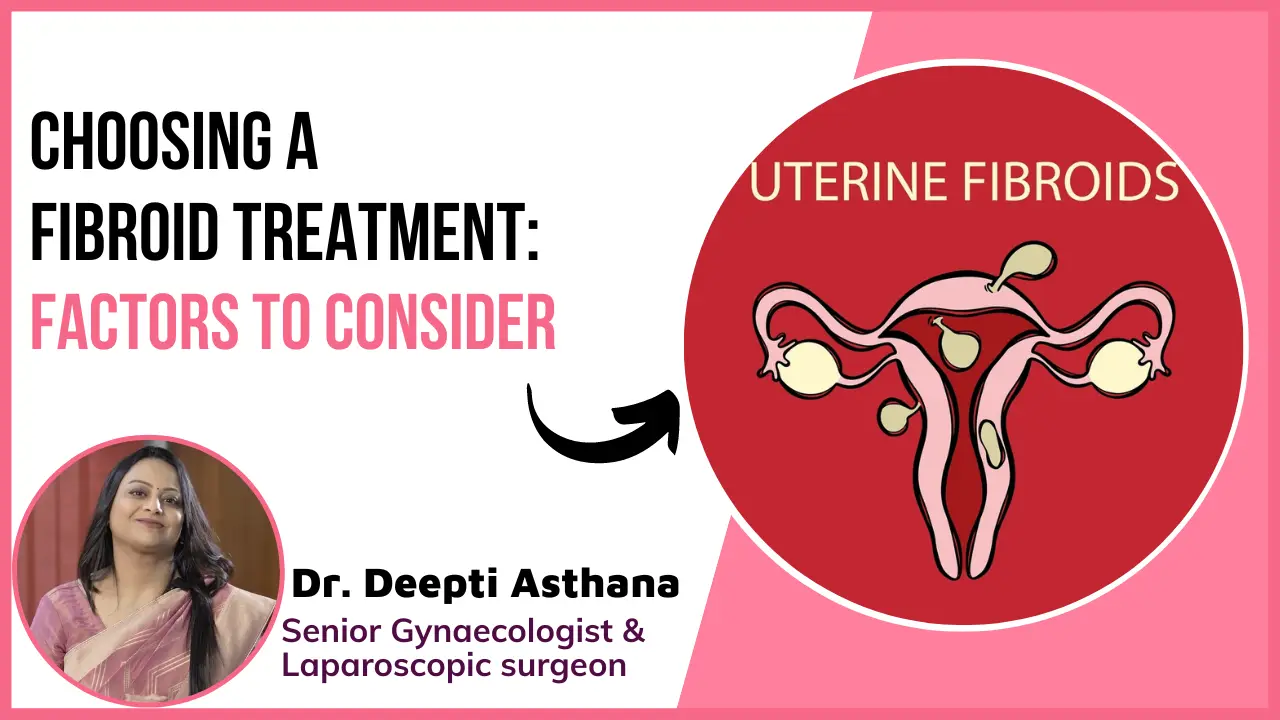
Table of Contents
Fibroids are non-cancerous tumors that can grow in or around the uterus, affecting millions of women worldwide. If you have been diagnosed with fibroids, choosing the right treatment option can be overwhelming. Fortunately, with expert guidance from Dr Deepti Asthana, a trusted provider of fibroid treatment in Gurgaon, you can make an informed decision. In this article, we’ll discuss the top factors you should consider when selecting a fibroid treatment that’s right for you.
Type of Fibroids
Location and Size of Fibroids
When choosing a fibroid treatment, the type of fibroids you have is a crucial factor to consider. Fibroids are classified based on their location within the uterus. Submucosal fibroids grow inside the uterine cavity and can affect fertility. Intramural fibroids grow within the uterine wall and can cause pain and heavy bleeding. Subserosal fibroids grow outside the uterus and can cause pressure and discomfort. Another factor to consider is the size of the fibroids, as larger fibroids may require more invasive treatments.
Consultation with Dr Deepti Asthana
Dr Deepti Asthana, a leading provider of fibroid treatment in Gurgaon, offers personalized consultation to help you understand your fibroid type, location, and size. With her expertise, she can recommend the best fibroid treatment option that’s tailored to your individual needs.
Symptoms
Severity of Symptoms
Fibroid symptoms can significantly impact your quality of life. The symptoms you experience may vary depending on the type, size, and location of your fibroids. Common symptoms include heavy bleeding, pelvic pain, pressure, and fertility problems. If your symptoms are mild, you may not require treatment. However, if your symptoms are severe, you may need to consider more aggressive treatment options.
Management of Symptoms
Dr Deepti Asthana provides a range of fibroid treatment options to manage your symptoms. She can help you choose the most appropriate treatment option based on your symptoms and individual needs.
Fertility Goals
Desire for Future Pregnancy
If you plan to have children in the future, fertility preservation should be a crucial factor in your decision-making process. Certain fibroid treatment options can affect your fertility. For instance, if you have submucosal fibroids that affect your uterine cavity, you may need to consider surgical removal. While this procedure can improve your chances of conceiving, it can also increase the risk of scar tissue formation. Dr Deepti Asthana can guide you through the pros and cons of each treatment option and help you make an informed decision.
Age and Reproductive History
Your age and reproductive history can also affect your fertility goals and fibroid treatment options. Women over 40 who have completed childbearing may choose to undergo a hysterectomy to remove their uterus and fibroids. However, younger women may opt for less invasive treatments like uterine fibroid embolization or myomectomy. Dr Deepti Asthana can help you assess the pros and cons of each treatment option based on your age and reproductive history.
Potential Risks
Like any medical procedure, fibroid treatment options come with potential risks and complications. Some treatment options, like surgery, carry a higher risk of complications, such as bleeding, infection, or injury to surrounding organs. Uterine fibroid embolization can cause nausea, fever, or pain after the procedure. It’s essential to understand the potential risks of each treatment option and weigh them against the potential benefits.
Side Effects
In addition to potential risks, fibroid treatment options can also cause side effects. Hormonal treatments like birth control pills or GnRH agonists can cause hot flashes, mood swings, or vaginal dryness. Surgery can cause scarring or adhesions that may affect future fertility. It’s crucial to discuss potential side effects with Dr Deepti Asthana and ensure that you understand the risks and benefits of each treatment option.
Recovery Time
Length of Recovery
Another critical factor to consider when choosing a fibroid treatment option is the length of recovery time. Surgical options like hysterectomy or myomectomy may require a more extended recovery period, while non-invasive options like uterine fibroid embolization may require only a few days of recovery time. It’s essential to consider your work and family obligations and choose a treatment option that fits your lifestyle.
Post-Procedure Care
After your fibroid treatment, it’s crucial to follow post-procedure care instructions to ensure a smooth recovery. Depending on your treatment option, Dr Deepti Asthana may recommend avoiding heavy lifting, sexual activity, or strenuous exercise for a certain period. She will also provide you with pain management instructions and follow-up appointments to monitor your recovery.
Treatment Costs
Fibroid treatment costs can vary widely depending on the type of treatment option you choose. Surgical options like hysterectomy or myomectomy can be more expensive due to hospitalization and anesthesia costs. Non-invasive options like uterine fibroid embolization may be less expensive.
Choosing a fibroid treatment option is a personal decision that depends on several factors, including the type of fibroids, symptoms, fertility goals, risks and side effects, recovery time, and cost. With expert guidance from Dr Deepti Asthana, a trusted provider of fibroid treatment in Gurgaon, you can make an informed decision that’s right for you. By considering these factors and discussing your options with Dr Deepti Asthana, you can find a fibroid treatment option that provides effective relief and improves your quality of life.



Comments (1)
Myomectomy Recovery Care | What to Expect & Self-Care Tipssays:
August 8, 2024 at 6:18 pm[…] Read More : Choosing A Fibroid Treatment: Factors To Consider […]